The Feather Thief, by Kirk Wallace Johnson proves the old adage that "truth is stranger than fiction." Though entirely non-fiction, The Feather Thief reads like a novel. As a novelist and short story writer, I sure wish I could've come up with this plot. While the crime around which the story revolves is one related to fly fishing, Wallace's account focuses much more on conservation. You definitely do not need to be a fly fisher to enjoy this book.
In a tale of tenuous connections and their enormous impacts, The Feather Thief tells the story of Edwin Rist, a young man obsessed with the art of tying Victorian salmon flies- flies made from arcane recipes using feathers which are almost impossible to get.
In the late 1800s and early 1900s, the Victorian obsession with feathers for fashion created the greatest mass extinction of species in human history, as countless birds from the world over were harvested in order to feed Englands insatiable thirst for feathers.
For a bit of perspective, consider that it takes about 10 million feathers to make a ton. From 1914-1917, 900 tons of feathers were imported to England -mostly during WWI. The price of some bird species would fetch exceeded that of gold.
Shortly after the war, the plume trade was stopped. And today, virtually all of the bird species that survived it remain endangered. Over 100 years later, feathers from these species, once the object of England's 19th century fashion trend-and vital ingredients for Victorian salmon flies that are Edwin Rist's obsession-are almost impossible to get.
More Like This
To solve this problem and finance his education, in 2009 Rist stole hundreds of skins of rare and extinct birds from the Tring Natural History museum in England. The low-tech, almost naïve, ease with which he took the 299 skins is interesting in itself. Rist then blatantly sold them online, on various fly tying sites and eBay, both of which should have known that these feathers were illegal to traffic in, based on the CITES (Convention on International Trade in Endangered Species) Treaty.
Rist was eventually caught and a handful of the skins recovered. Ultimately, his greatest crime may not have been stealing the skins but removing their tags. In doing so, Rist destroyed unique metadata about each skin's which made it potentially invaluable to answering questions about biology and environmental science that we haven't even thought to ask yet. To serve a small set of fanatics in a dying art, he stole from us all.
Wallace's account of Rist's theft, eventual capture and its aftermath is, ultimately, anti-climactic. I agree with my friend and editor for Orvis, Philip Monahan, that the book ended on a weak note. Were it fiction, the author would've salved our sense of justice with comeuppance, but in retrospect, the anti-climax it is understandable. Before he wrote The Feather Thief, Kirk Wallace Johnson founded the List project and spent years of his life on a futile quest to get refugee status for Iraqi and Afghani citizens whose employment by the US military marked them for death in their home countries. If you want to understand why Johnson might abandon the quest to figure out why this entire subculture of men seemed not only obsessed with these feathers, but largely unaffected by how they got them, consider the utter apathy he experienced during his investigation.
- The fly tyers had no conception of the enormity of the loss to science (and thus mankind), as it conflicted with their own pathetic self-interests.
- The police considered the theft solved and moved on to higher-profile cases, even though the stolen feathers and other feathers from protected species are being criminally traded in the open every day and it would be a simple matter to stem the market.
- Even after finding the birds, the museum didn't care because all the metadata which made them scientifically valuable had been stripped from them.
- The court accepted a barely plausible defense and gave Rist a one-year suspended sentence; he never served a day in jail, despite selling tens of thousands in the feathers.
- Perhaps the saddest note and most demoralizing note of all is that nobody else seems to have taken up the banner even after publication of this highly publicized book. The auction platforms don't care and nobody is policing them. Despite Johnson's numerous attempts to get them to ban the sales based on the CITES act, I just ran a search for some of the protected species listed in the book and found their feathers on eBay. Given their rarity, these feathers might even be from the Tring heist! After this, I felt demoralized, too.
Specifically because justice was not served, it's hard not to see the book as a metaphor for the world we live in, where the stroke of an unthinking pen has, and continues to, erase years of environmental legislation and justice. As I write this, even the work to allow patriation of our Iraqi and Afghani allies is being rolled back, paltry as it was. In such times, even if we avert environmental disaster for a while, ultimately greed, short-shortsightedness, and narrow-minded self-interest seem doomed to make all progress temporary. And you must wonder, will the progress ever outweigh the devastation, or is our fate written and we should enjoy whatever plunder we have while we have it, as many of the characters in the book espoused? One tyer even argued that it is all moot as after the rapture, there will be no more endangered species to protect. How do you triumph over ignorance like that?
As the author noted, as a fly fisher, it's difficult to condemn the acts of one group of people who lack a conservation mind set without reviewing our own obsessions, their roots, and impacts. ("Wild" German brown trout, anybody?) Yes, The Feather Thief is a grand and intriguing story in its own right, with a lot of educational aspects but, for the self-reflection alone, it's definitely worth the read.







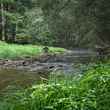





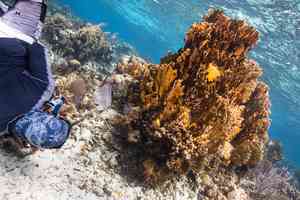

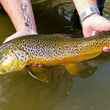
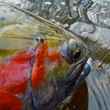




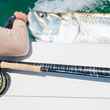
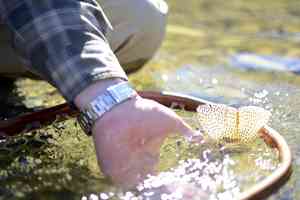
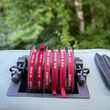

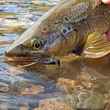
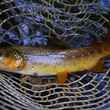

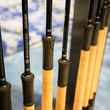

Comments